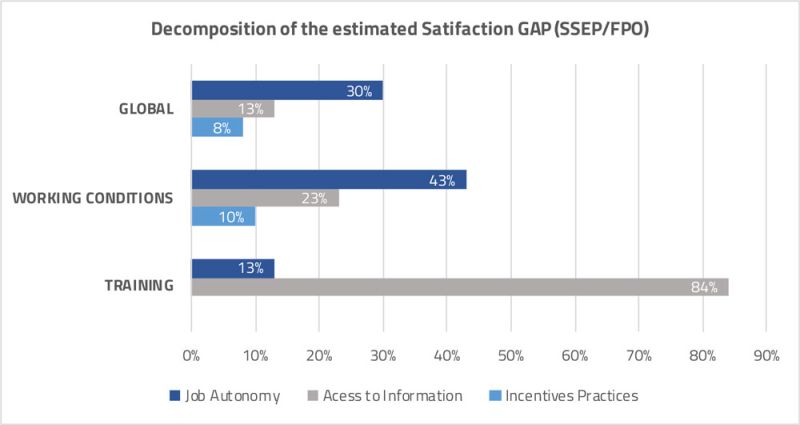Xavier Joutard, Francesca Petrella et Nadine Richez-Battesti, 2025, Kyklos, forthcoming.
»
The higher job satisfaction declared by employees of social enterprises stems from their greater autonomy,
better access to information, and certain incentive practices.
RESEARCH PROGRAM
In France, the social enterprise field is part of the social and solidarity economy (SSE), composed of associations, cooperatives, mutual societies, and foundations with at least one employee, as defined by INSEE. SSE is an important and growing sector of activity in France, accounting for more than 10% of all jobs in 2021. Since 2010, the job creation rate within SSE has been positive. Actually, it demonstrated a certain dynamism and resilience in the face of the 2008 crisis as well as more recently, during the COVID pandemic. Importantly, SSE is now part of an EU strategy for tackling unmet social and environmental needs.
We explore the somewhat paradoxical finding that social enterprise employees experience greater job satisfaction than their counterparts at For-Profit Organizations (FPO), even though their pay and employment contracts are usually less favorable. Our hypothesis is that the difference in employee job satisfaction between social enterprises and for-profit organizations can be partially explained by practices of work organization (WO) and management by objective (MO). Work organization variables include the characteristics of the job itself (such as task variety and significance, degree of autonomy, control, meaningfulness of the work) and those of the work environment (such as relations with colleagues, access to information, participation in decisions). Management by objectives includes variables related to incentives and performance evaluation (such as performancerelated schemes, profit sharing, and collective bonuses) and target setting (when goals are set for different variables: profit, sales, labor costs, total costs, and quality). Our research question is relevant insofar as human resource management systems within social enterprises have paradoxically received little attention in the literature, even though they are essential to these organizations.
The article describes how WO- and MO-derived variables were used as covariates to determine the difference in job satisfaction between employees of social enterprises and for-profit organizations. Our approach relies on response data on both employees and management from the 2011 French RESPONSE survey, the only survey available that considers and identifies a broad range of social enterprises. The richness of the data enables us to construct multiple homogeneous indices and to use the panel dimension to control for potential endogenous responses linked to the variables composing them. Our nine indices notably include autonomy in work, access to information, quality of interpersonal relations, and incentive mechanisms.
PAPER’S CONTRIBUTIONS
First, we confirm that employee satisfaction at SSEOs is higher – always by around 5 p.p. – than that at FPOs. This applies both to overall satisfaction (70%) and to satisfaction along two dimensions: working conditions (68%) and training opportunities (62 %).
Then, we show that the specific work organization of social enterprises explains a large part of the observed job satisfaction differential, both in overall satisfaction and in specific satisfaction with access to training and working conditions (between 52 and 60 %.).
If we look in detail at the components of work organization and management objectives, the higher job satisfaction declared by employees of social enterprises stems from their greater autonomy, better access to information, and certain incentive practices. Results on significant contributions to the differences in ob satisfaction are shown in the graphic below.
In contrast to earlier studies, however, our results show that these work organization variables do not have more value for SSEO employees than for FPO employees when it comes to overall job satisfaction. This result casts doubt on the widespread hypothesis that social enterprise employees attach more weight to the nonmonetary advantages of their work than their counterparts in for-profit organizations.

Figure: Decomposition of the estimated Satifaction GAP (SSEP/FPO)
FUTURE RESEARCH
In this paper, we were not able to address the issue of SSE endogeneity: identifying whether the greater employee satisfaction at SSEOs stems from better promotion of intrinsic or pro-social motivations or whether, as our results suggest, it is due to their WO being more participative and fulfilling, is challenging. This is a promising direction for future research, but would require either a natural experiment or availability of panel data and observations of significant individual mobility between SSEOs and FPOs. Nevertheless, the questions addressed in this paper are still crucial and relevant to the policy agenda, given the growing awareness that all workers deserve a better quality of life at work, along with more participative and sense-making work environments. As SSEOs more frequently adopt such WO practices, like job autonomy and access to information, they’re the example for other organizations to follow.
→ This article was issued in AMSE Newletter, Winter 2024.